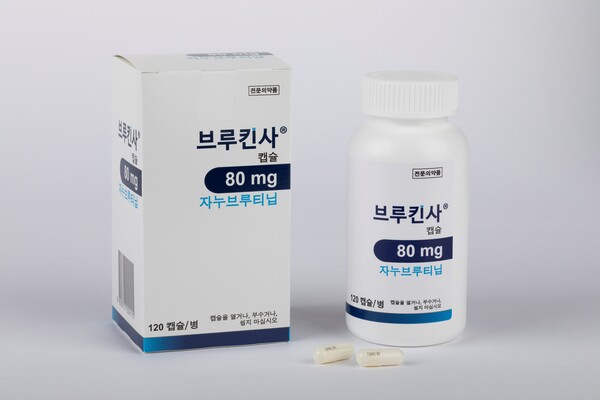BeiGene, an anticancer drug developer, said Monday that Brukinsa Capsule (zanubrutinib) will receive expanded reimbursement starting this month for treating mantle cell lymphoma (MCL), chronic lymphocytic leukemia (CLL), or small lymphocytic lymphoma (SLL), in Korea.
The expanded coverage applies to monotherapy in patients with MCL who have received one or more prior therapies, to monotherapy in patients with previously untreated CLL or SLL who are 65 years of age or older, and to monotherapy in patients with CLL or SLL who have received one or more prior therapies.

Brukinsa is a second-generation BTK (Bruton’s tyrosine kinase) inhibitor that targets BTK, a targeted anticancer drug that inhibits malignant B-cells by blocking BTK proteins, which are signaling factors that affect B-cell growth, differentiation, and survival; BeiGene explained.
Brukinsa's coverage expansion is based on positive results from two global phase 3 studies, “ALPINE” and “SEQUOIA,” in CLL or SLL, and two open-label, multicenter, single-arm studies, “206” and “AU-003,” in MCL.
The ALPINE study is a global phase 3 study comparing Brukinsa and ibrutinib in patients with relapsed or refractory CLL or SLL who have received at least one prior therapy. The results showed that the primary endpoint, overall response rate (ORR), was 83.5 percent in the Brukinsa arm and 74.2 percent in the ibrutinib arm, making it the first study to demonstrate superiority over first-generation BTK inhibitors.
Regarding safety, Brukinsa demonstrated significant improvements in overall cardiovascular safety compared to ibrutinib, with lower rates of cardiac events, discontinuation or death due to cardiac-related adverse events, and discontinuation due to adverse events reported in the Brukinsa arm. Lower rates of treatment discontinuation due to adverse events also demonstrated superior tolerability compared to existing BTK inhibitors.
Based on this evidence, the current U.S. NCCN guidelines have been revised to recommend Brukinsa as the preferred option. This recommendation level is the same for MCL.
The SEQUOIA study was a global phase 3 study comparing Brukinsa with bendamustine + rituximab in previously untreated CLL and SLL patients. The primary endpoint, PFS (progression-free survival), was 85.5 percent (n=241) in the Brukinsa arm and 69.5 percent (n=238) in the control arm at 24 months (HR 0.42, [95 percent CI: 0.28, 0.63], P<0.0001).
Results from two open-label, multicenter, single-arm studies, 206 and AU-003, in patients with relapsed or refractory MCL demonstrated a consistently high response rate (84 percent) and sustained responses (19.5 months in 206 and 18.5 months in AU-003). The consistently high response rate in the Brukinsa arm has been sustained in longer-term studies of about three years.
“We are very pleased that this coverage expansion will make the benefits of Brukinsa as a next-generation treatment option more widely available to patients with MCL with a short life expectancy, as well as CLL or SLL patients suffering from chronic relapse,” BeiGene Korea General Manager Yang Ji-hye said. “BeiGene will continue to strive to fundamentally improve patient access based on our broad oncology and hematology portfolio, including Brukinsa.”
Professor Yang Deok-hwan of the Department of Hematology at Chonnam National University Hwasun Hospital said, “Patients with relapsed or refractory MCL have limited options for further treatment, so the availability of this new treatment option Brukinsa is very positive for improving patient outcomes.”
Professor Yang added that by making next-generation BTK inhibitor targeted therapy available to patients with CLL or SLL, more patients will be able to benefit from this treatment with improved survival and safety.
CLL/SLL is a type of malignant blood tumor characterized by a significant increase in abnormal leukemic B-lymphocytes in the blood and lymph nodes and invasion of peripheral blood, bone marrow, and lymphoid tissue. About 190 patients are diagnosed annually in Korea, and the disease is characterized by slow progression, usually over months to years, with repeated relapses and remissions.
MCL is a rare subtype of non-Hodgkin's lymphoma and is known as an aggressive lymphoma with a poor prognosis. The disease progresses rapidly and has a high recurrence rate even after treatment. The number of patients in Korea is estimated to be around 150 annually.
Aside from these recently reimbursed indications, Brukinsa Capsule is covered for patients with Waldenström's macroglobulinemia (WM), an uncommon blood cell cancer that originates from malignant B-cells, who have received one or more prior therapies.
Related articles
- BeiGene's anticancer drug Brukinsa to get expanded insurance coverage
- Based on improved global status, BeiGene targets US market in earnest
- BeiGene applies for insurance benefits for esophageal cancer drug Tevimbra
- [ASH 2023] Blood disorder innovators highlight latest progress at US meet
- New study finds clue to predict pancreatic cancer's progression and metastasis
- Koreans' genetic variants associated with autism spectrum disorder identified for 1st time
- ‘BTK Inhibitor Brukinsa is a safe option in CLL treatment’
- Lilly's BTK inhibitor Jaypirca nears approval in Korea for treating mantle cell lymphoma

